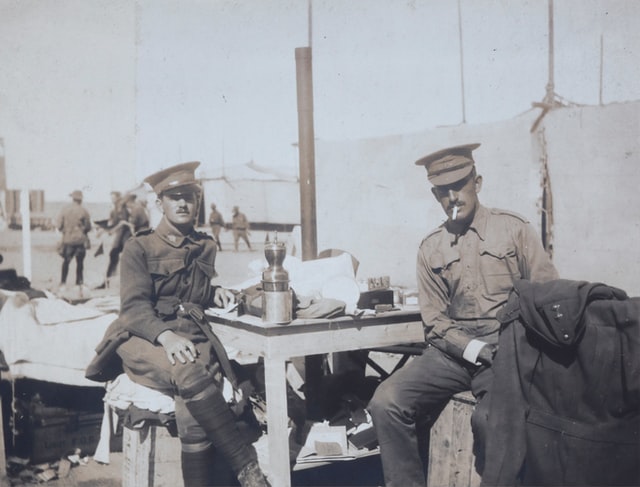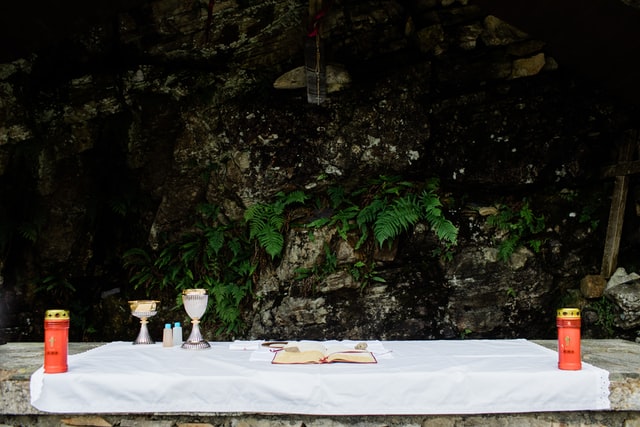by Luke Krueger
Dramatis Personae:
Elihu, male: dubious of Moses’ plan.
Miriam, female: Moses’ sister who trusts in his seeming to lack a plan.
Place: At the shore of the Red Sea
This play was commissioned by St. Paul’s Episcopal Church in DeKalb, Illinois in 2015 and performed as part of the Holy Week Service.
Miriam was played by Madeline Lyons.
Elihu was played by Ryan Massie.
Production note: For the performance large swaths of shiny blue cloth were placed in the main aisle. When the sea begins to rumble, the children of the congregation made the material undulate like waves. Upon the sea opening they made walls of blue alongside the aisle. Miriam and Elihu exited down this path, and they encouraged others of the congregation to follow them through the sea, so to speak.
Miriam and another Israelite, Elihu, are at the front of the congregation, in front of the alter. Miriam is writing calmly. Elihu paces, fretting. Miriam seems un-phased, calm, a contrast to her companion.
MIRIAM
What’d he say to you?
ELIHU
“You only have to keep still.”
MIRIAM
So…? Listen. Stay still. You’re getting me worked up.
ELIHU
Can you believe that though? Keep still? Keep still? Don’t really have much of a choice. There’s a big swath of water in front of me, and Pharaoh’s army behind me. Keep still…that’s great advice. What a great leader. Know what I think? I think he doesn’t have clue what to do, and all he can say is, “Keep still.” What a yutz. Bunch of desperate twaddle if you ask me.
MIRIAM
Was that all he said, “Keep still?”
ELIHU
He said something else about “Do not be afraid and stand firm” and then some nonsense that the Lord will deliver us. That we’ll be astonished by what the Lord will accomplish for us today. And I was like, “Moses, do you see that huge cloud of dust beyond the horizon? That’s Pharaoh and his army with spears, and chariots, and swords. And what have we got? Zilch! Bupkis!”
MIRIAM
Did you really say that to him?
ELIHU
(Beat) No. But I wanted to. I should’ve. You know what one guy said though, and I was like, “This guy gets it.” He says to Moses, “Was it because there were no graves in Egypt that you have taken us away to the wilderness to die?” That was some serious chutzpah.
MIRIAM
That was kind of snarky.
ELIHU
Snarky? No, I was like, “Preach, brother!”
MIRIAM
It was uncalled for.
ELIHU
Uncalled for? It was the truth. You wanna know what was uncalled for, dragging us out here with no plan. I mean it all sounds great: “Turn the Nile into blood, frogs dropping from the sky, flies swarming, animals dying, and so on, and then that grand, ‘Let my people go’ pronouncement.” Sure, that all sounds great, but I mean, at any point did Moses forget the fact that if all that worked; and we are released from our bondage; and set free from Egypt: We’re still in the middle of a desert!
MIRIAM
Aren’t you just a pleasant ray of sunshine. (Beat) If you’re not happy here, you don’t trust in Moses, well, you know where to find Pharaoh’s army. Go see if he’ll take you back. I’m sure he’ll be in a forgiving mood after that whole, death of the first-born male in every household thing.
ELIHU
I’m sorry. I know Aaron and Moses are your brothers. I’m just, I’m a little dubious. Moses just doesn’t seem to know what he’s doing. After we voiced our concerns, do you know what he did? Walked off and prayed. Said he needed to talk to God. I don’t know about you, but I don’t see any burning bushes anywhere, so I don’t know where he’s gonna find God around here. (Beat) What are you doing?
MIRIAM
Writing a song.
ELIHU
That’s nice…and completely inappropriate.
MIRIAM
Oh, come on!
ELIHU
We have the biggest army in the world bearing down on us, and you’re writing a song?
MIRIAM
Wanna hear it?
ELIHU
(Mocking) Wanna hear it? No, I don’t wanna hear it. You know what I want? I want to not die. (Short pause) How can you be so calm?
MIRIAM
Because I trust in the Lord and my brother.
ELIHU
You trust in the Lord and your brother. Well, shut the front door!
MIRIAM
Shut the front door is right. Because we did, and we painted lamb’s blood on that door. And the Angel of Death passed over us. All this time, all these things, the river of blood, the frogs, the insects, none of that resonated with you?
ELIHU
(Beat) I confess, I was somewhat impressed. (Looking off) Look at your brother. What is he doing now?
MIRIAM
And you haven’t noticed that since we’ve been talking, a giant cloud has rolled in and been placed between us and Pharaoh’s army?
ELIHU
(Still looking off, not hearing her) He’s standing there with his staff in hand, arms raised, just looking at the sea. What’s he thinking? He’s just gonna open up the sea? Now look at him. (Yelling off) Oh, yeah, Moses, I’m sure just waving your hand over the sea is going to make it just split open.
The sea opens up. Elihu is flabbergasted.
MIRIAM
Did my brother say anything else to you?
ELIHU
(Astonished) “The Lord will fight for you, and you have only to keep still.”
MIRIAM
So are you going to stand there gawking, or are you going to wade into the path God has cleared for us.
ELIHU
You first.
MIRIAM
You still don’t believe.
ELIHU
Miriam, I’m a pragmatist. I believe by some miracle the sea has parted, but what’s to say Pharaoh won’t be able to pursue us through this path?
MIRIAM
“I will sing to the Lord, for he has triumphed gloriously; horse and rider he has thrown into the sea.”
ELIHU
What’s that?
MIRIAM
The song I was writing. He hasn’t taken us this far to let us perish. (Beat. Elihu looks down the aisle, the open path of the sea.) Age before beauty. (Elihu is hesitant.) We are no longer to keep still. Go!
They both exit down the aisle.
Curtain
Luke is an active member of the Episcopal Church in Vermont where he serves in a number of roles at the parish (vestry), diocesan (chair of the Missional Vitality task force), and national (alternate delegate for the House of Deputies at the General Convention) levels. Additionally, in service to the church, Luke serves on the board of the Brookhaven Treatment and Learning Center. He is currently in the process of heeding the call to serve as a priest in the Episcopal Church.
Luke lives in Manchester, Vermont with his wife and two daughters. He teaches English at Arlington Memorial High School, where Norman Rockwell’s children attended school. Though a playwright, Luke’s poem “A God Joke” was published by the Purpled Nail.






